#also not to say that trigun is a very Christian bit of media but also??? it kinda is?
Explore tagged Tumblr posts
Text
Trigun and Christianity

In lieu of trigun Stampedes choice to make Wolfwood an undertaker instead of a priest (to, well, my disappointment), I thought it might be interesting to look at some of the Christian themes in Trigun, and then also look at why they might have decided to choose for Wolfwood to be a undertaker then a preist, and a potential reason to why Trigun has these Christian themes. Also, btw, this is chock full of manga spoilers so, beware!
To start it off... trigun is actually... pretty heavy on Christian themes. Fuck man, the main character is basically an angel, and in one of the first volumes they literally describe the plants as something divine (although they are later declared to be something humans made... But nevertheless the very clear imagery is there). Also what features very strongly is pacifism and the themes of unconditional love; Vash's refusal to kill coming from believing that going forward, anyone can change, even when he is literally being harmed or attempted to be killed by others. These themes of pacifism and unconditional love are very Christian, and Vash's actions very much centre him as a Jesus-like character. In fact, even the way that he (and knives) was born, a virgin birth, also could be seen as an allusion, as well as the way that he holds a physical form as a human while being more than human- Jesus being considered a 'son of man' while also being the son of God; ie, something in-between, something both divine and human. Knives as well is written in that angelic and divine light, although he is done so in a dark opposite of Vash, with an emphasis on his 'divinity' for imagery as he is obsessed with it. Interestingly, contrast to Knives, Vash, who goes around as a human, is multiple times called a Devil for his reputation, although he is the one that actually is virtuous... This in a way also alludes to him as a Jesus-like figure, as that Jesus was ultimately sought after by the authorities and in some places hated and even driven away by people.
12 disciples
As well, Nightow is pretty blatant that the gung ho guns, of which there are 12, is a allusion to the 12 disciples; hell, Wolfwood calls them straight up disciples when he is at Jeneora Rock. One might argue that then whether that posits Knives as a Jesus figure as that they follow Knives directions, or if one would consider Vash to be the Jesus figure, as the 12 literally seek out, and 'follow' Vash, and of which one of them literally betrays (although, technically, Wolfwoods betrayal goes both ways). However, I don't think that argument is really one that matters, as it's more of the aesthetic of Christianity that Nightow likes in this matter, not the philosophical implications.

As well, as mentioned above, Wolfwood is very Judas-coded; he gets close to Vash, only to inevitably betray him and deliver him up to his fate, while clearly being torn up about it. Vash is not surprised at all when Wolfwood tells him that he was one of the gung ho guns, and you get the sense that he knew about it all along, and knew exactly what he was walking into. Yet he still loves and forgives Wolfwood for all of it. Which... is exactly the same thing that occurs between Judas and Jesus, Jesus willingly going with Judas even though he knew what lay before him.
Wolfwood
As well, quite obviously adding to the heavy Christian themes of trigun, is that Wolfwood calls himself a priest. Although indeed it's part of his front, it's clear Wolfwood in the manga is religious, challenging and calling upon God in response to seeing the Knives born, and his response to the fifth moon incidence where he questions if it was the hand of God (which, actually, is caused by Vash's hand... again alluding to the 'divinity' of Vash and Knives). This clear religious affiliation continues through the series, such as when he is rescuing Vash from Knives, and even praying while he is on the ship with the people that helped vash.
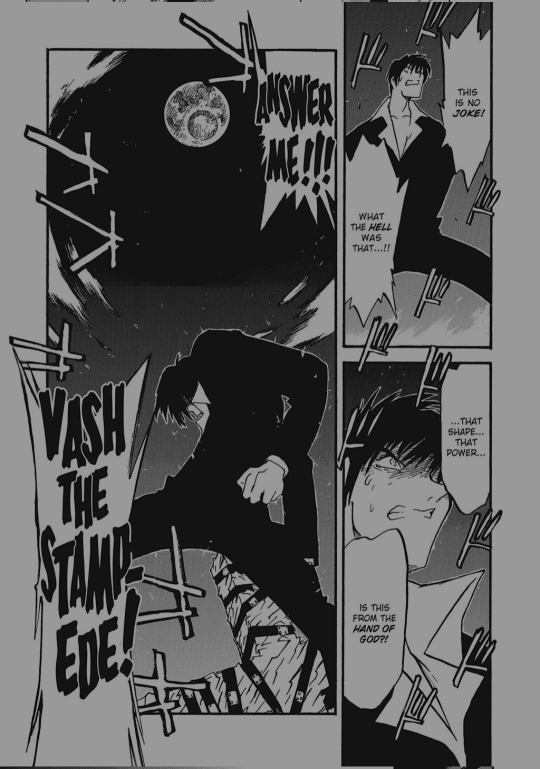
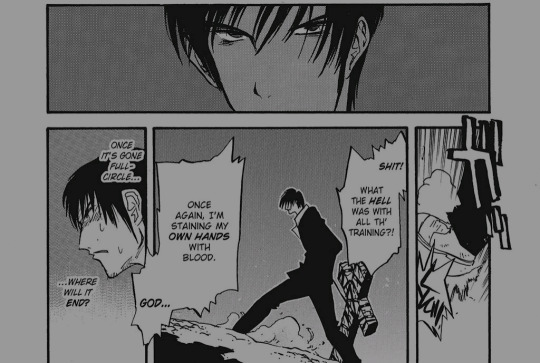
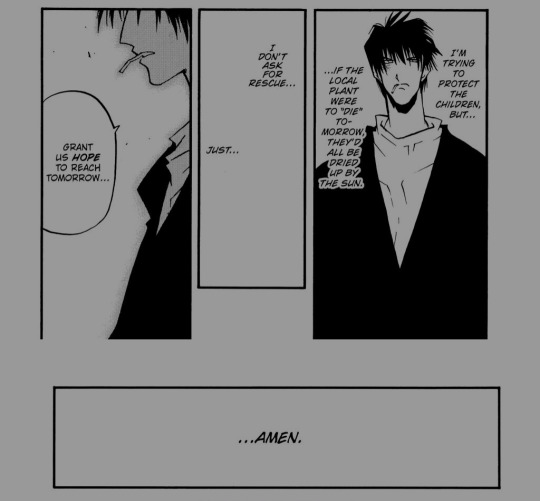
Wolfwood also throughout the series is very clearly is morally wraught with guilt over his choices and sins... Something that's very Catholic/Christian. Hell, the fact that the punisher, the insignia of his murderous profession, is a literal heavy cross that Wolfwood carries with him, is poetic irony; he's literally carrying around the embodiment of his sins and his guilt from his profession and choices, which weighs both heavily on his physical body but also him emotionally. Wolfwood's guilt over his sins and choices comes to its climax when he's about to die when rescuing Vash from Knives, after betraying him; where he questions whether he can be forgiven for what he has done and whether he was wrong, and in response Vash saves him, declaring that he is not wrong; not wrong to go against orders, leaving his vocation of being a murderer behind, in trying to save Vash and moving forward. In declaring Wolfwood that he was not wrong, what Vash (heavily implied divine, Jesus-like character) is declaring is that Wolfwood can be forgiven for his sins, is already forgiven for his betrayal (unconditional love, anyone?), and that Wolfwood can change, that his past doesn't define him, because his future is also a blank ticket.
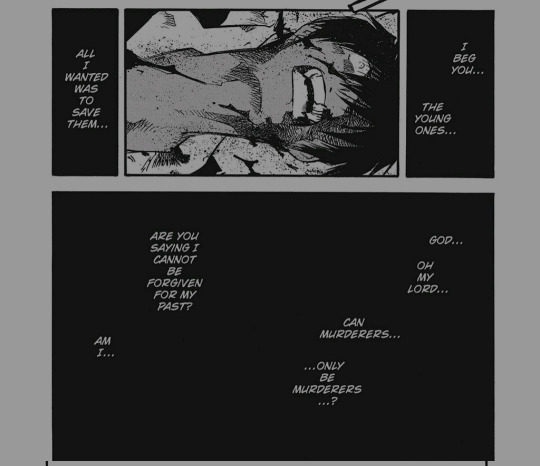

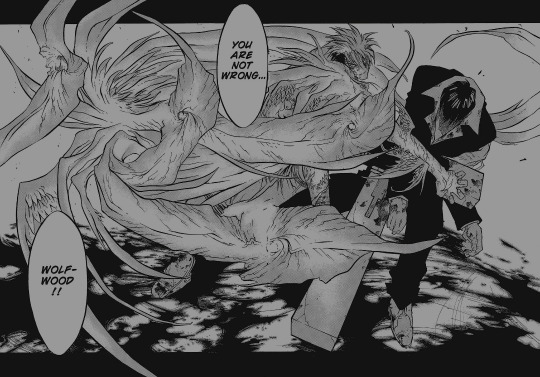
As well, this is followed up later by Wolfwoods confession to Vash that he hates killing:

The confession and the way he phrases it- seeing all humans as his brethren (although, in this sense he may be speaking tangentially about Livio) is something that also has Christian overtones. (Also, the way that they mention Vash sees the whole of humans as his relatives, also ties into that; except personally I'd argue that's more of a Indigenous view then a Christian, but theres plenty of things that overlap with other theologies and philosophies within the manga that aren't just characteristics of Christianity).
Redemption via acts
There's also a theme of redemption via acts, which both Wolfwood and Vash lean into heavily as a result of guilt from their 'sins', something that is very... Well, again, Christian, especially Catholic. Vash, from being unable to stop Knives and having obliterated July and just his and knives general existence, and Wolfwood from his profession, and so they both struggle with immense feelings of guilt. As a result both are very self-sacrificing; Vash very obviously so throughout the series, and Wolfwood in a quieter way, in choosing to continue to work to protect the orphanage, even though he desperately wants to escape the life he leads and hates killing people. They both don't believe they deserve to be loved because of the weight of their sins, and so they redeem themselves the only way they know how by self-sacrifice; this literally causing Wolfwoods death as he didn't reach our to Vash for help, and is evident in the way Legato looks at Vash at the end and realizes he sees a man that only sees himself as a tool and hates himself. This belief of Vash's that he doesn't deserve love/nice things is something that is also interesting, because he so aggressively pushes the 'blank ticket of the future', ie, unconditional love, while clearly being unable to apply it to himself.
Tldr: the point is, Trigun is very heavily Christian themed, both in aesthetic and philosophy, and the characterization of both Vash and Wolfwood reflect that. The show is rampant with such Christian philosophical themes as unconditional love, sin and guilt, confessions, forgiveness and redemption through self-sacrifice; for aesthetic ones, well, literal 'angels' as main characters, Wolfwood being a priest and carrying a cross, the 12 gung ho guns as 12 disciples.
Wolfwood as an Undertaker
Since Trigun is so heavily Christian themed, it makes it... well, a bit of a strange choice to pull the fact that Wolfwood is a preist out, since him as a preist further emphasizes the moral quandries within the story and the themes of sins/guilt/forgiveness and unconditional love. However, as one other post here on tumblr mentioned, stampede as an iteration of trigun is more directed towards a more modern and Japanese audience, some of which can be seen with the revamp of the character designs to make them more relatable, and I think they mentioned some specific character traits with Meryl. This re-vamping, especially one specifically for a Japanese audience might explain why Wolfwood becomes a undertaker instead of being a Christian priest. Nightow in the back panels in the manga is clearly is very enthralled with American culture- and his knowledge and love of the American genres shows pretty strongly in the themes and the setting for Trigun. In fact, the 1998 anime was better recieved in the west then in Japan, and a possible likelihood for it's higher popularity within the Americas is going to be directly because of the western audience being more familiar with the Western genre, as well as specifically, the Christian themes within the show (since western countries cultures are Christian based, even if one wasn't raised religious). As well, compared to the other typical gunslinging space western anime, Cowboy bebop, Trigun contains more Christian themes, which would make it less relatable, and less popular to the Japanese audience (of course there are many other differences in the shows, so I would be reluctant to chalk it up to just the religious themes in trigun- hell, Cowboy Bebop makes some great criticisms of capitalism that is not present in Trigun). Circling back to them revamping the show, if they are trying to make it more relatable to a Japanese audience, then removing more overly American influences, such as one of the characters literally being a Christian priest, would fit that bill quite well.
Trigun and Christianity... Why?
Also, I personally think that Nightow didn't exactly mean to make a story that is really heavily Christian themed. My sneaking suspicion from reading chapter 0, is the Nightow thought that writing a western with a main character gunslinger that is a pacifist would be a fun and interesting prospect, and then when he began to elaborate on it, he began to pull in more western (both cultural and genre wise) themes and aesthetics into the story, resulting in something that is very heavily Christian themed in the end.
EDIT: it's been raised to my attention by the lovely @trigum, that it says in the wikipedia on Nightow that he was raised buddhist and converted to Catholicism, although there is no source for that information. If so, this would, well, very obviously explain why Trigun is so heavy on Christian themes and negates the paragraph above. I'm not giving him enough credit then, my apologies Nightow!
EDIT 2:

Edit 3 (Feb 3): made a somewhat part 2, specifically looking at the phrase the 'bride of Christ'.
#trigun#trigun spoilers#trigun maximum#trigun anime#trigun 1998#trigun stampede#wolfwood#nicholas d. wolfwood#vash the stampede#knives millions#feels wierd to write about Christianity#uh. yeah if thjs is incoherent please ignore me hah#also not to say that trigun is a very Christian bit of media but also??? it kinda is?#as ex christian the amount of guilt coming off these characters is so v me in middle school figuring out im queer#also sad about wolfwood not being a preist for both poetic irony but also. let's be honest that poetic irony is hot#also like. nightow best charcter design ever. sorry no one will be able to design a better character then trained assasin priest#who carries a huge cross machine gun and is full of guilt over his sins#and loves children#is this also tangentally vashwood#yes. ignore me#vashwood#if ur like ur writing is rambly sorry! i know a bit of it is repetitive#do i care? nope not any more#nightow slapping both vash and wolfwood: these boys can fit so much christain guilt in them
482 notes
·
View notes